Brazil election: Class divides voters ahead of run-off
- Published
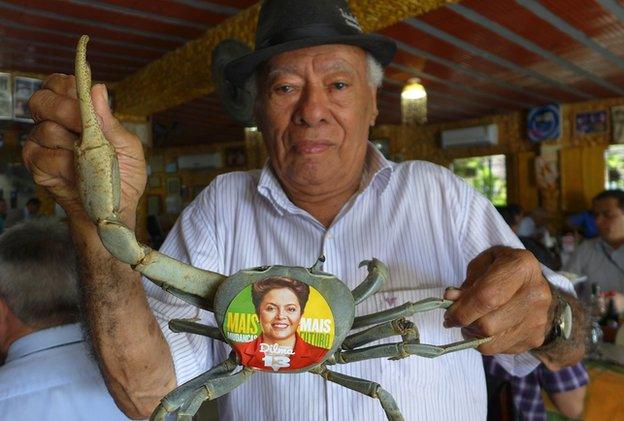
Restaurant owner Luiz da Gia is using a pet crab to show his support for Dilma Rousseff
Not since Brazil returned to democracy in 1985, after over two decades of military rule, has a presidential election revealed such deep splits in public opinion and mainly along class lines.
Polls suggest the second round run-off on Sunday is extremely close, with a slight lead by President Dilma Rousseff of the Workers Party (PT) against opposition candidate Aecio Neves of the Brazilian Social Democratic Party (PSDB).
"The surveys show that the lower class has decided for Dilma whereas the upper class has decided for Aecio," says political scientist Geraldo Tadeu Monteiro, director of the Rio University Research Institute.
"The battle ground is the middle class, especially the new middle class that came out of poverty in recent years."
Bought off
Aecio Neves is perceived as business friendly and regarded in the financial markets as someone to put the economy back on track, after four years of low growth rates and the country now technically in recession.
But in the north east, the poorest region in Brazil, Dilma Rousseff obtained her largest support in the first round, with almost 60% of votes.
This is where 28% of Brazil's population lives - and 55% of its poor.
The region benefitted most from the trademark social policies of the PT, such as the Bolsa Familia family grant scheme, prompting claims that an ill-informed electorate has been bought off.
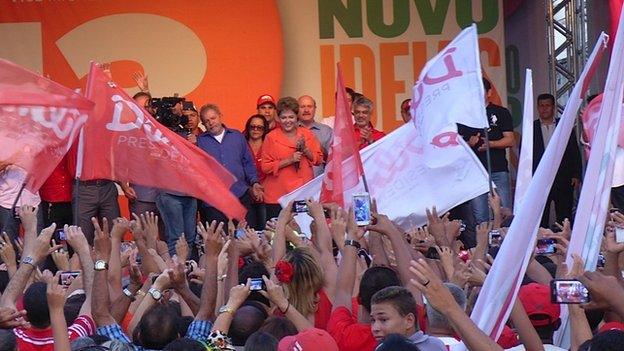
The crowds cheered for Dilma Rousseff in Goiana
Improvement in the region, however, goes beyond social assistance and includes investment in infrastructure, new federal universities, rural electricity and water programmes as well as government subsidies to attract new businesses and jobs.
In the centre of Goiana, in the state of Pernambuco, thousands gathered earlier this week to welcome President Rousseff in a campaign rally, joined by former President Luiz Inacio Lula da Silva, himself a 'nordestino'.
This is a city of 78,000 residents, 60km (37 miles) north of the capital, Recife.
New factories are bringing work opportunities beyond the traditional sugar cane industry.
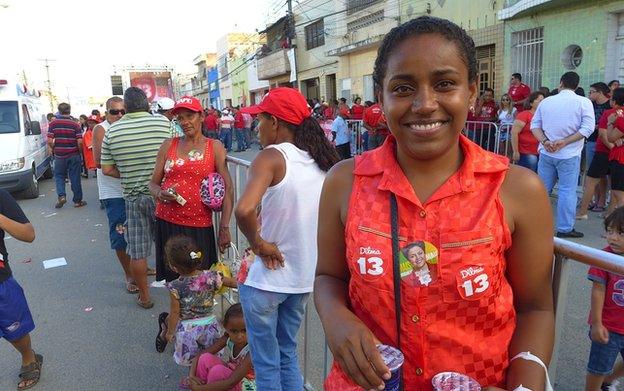
France Nadja da Silva Vieira, 25, is learning industrial sewing so she can work in the new Fiat factory
The highlight is the new Fiat factory, visited by Ms Rousseff and Mr Lula which is due to open early next year.
France Nadja da Silva Vieira, 25, covered herself with PT campaign stickers when she went to the event. She used to work as a babysitter but will soon be employed in the car industry.
"This region used to be abandoned, but people are getting new opportunities to work," says France, who taking a course in industrial sewing.
"Before, women could only work as maids but now there are jobs coming. I'm going to sew covers for car seats. I'm very excited!"
Economist Tania Bacelar, of Pernambuco's Federal University, is critical of the hostility towards people in the north east in the campaign and says it's natural that voters reflect their experiences.
"The voters are basing their choice on the improvements they've felt, having access to food, jobs, or universities," she says.
"That's a legitimate way to vote. In the same way, businessmen are also voting to defend their interests."
Losing confidence
In richer areas of the state capital there are fewer PT flags to be seen, and more evidence of support for Mr Neves.
The city of Recife's famous Boa Viagem beach is lined with Neves campaign flags and there are plenty of big cars with the yellow and blue PSDB stickers.
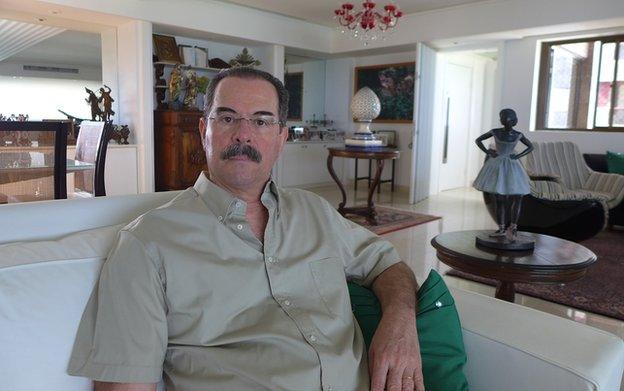
Antonio Carrilho, director of construction company Carrilho, wants change
The high-rise apartments looming over the sand are a product of the capital's powerful real estate industry. Construction companies are among Mr Neves' supporters.
"We are very concerned with the country's situation," says Antonio Carrilho, director of Carrilho, a construction company that has been in his family for 45 years.
"We know there's a big bill coming soon with energy prices going up, fuel prices going up, and people are losing confidence in the economy."
At the peak of the real estate boom, three years ago, he says 1,000 apartments were being sold every month in Recife. Today, it's little over 300.
"If people don't buy, I don't sell, I don't employ. It's a knock-on effect that isn't being felt yet, but it will come," he says.
Bosses from the state's once powerful sugar cane industry are also backing Mr Neves, angry with Ms Rousseff's policy of holding back fuel prices - which has led to a crisis in the ethanol industry.
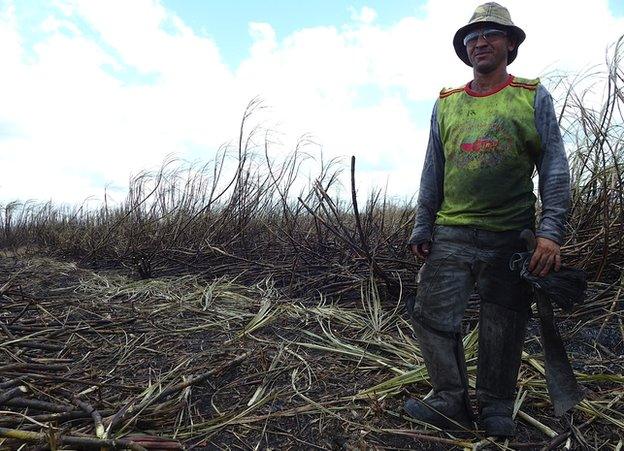
Givanildo Jose Cesario, 35, makes around $400 (£250) a month from harvesting sugar cane
But within this industry, the social divide is once again evident, with those working in the plantations often thinking differently to the owners.
Survive
Back in Goiana, Ms Rousseff seems to be a unanimous choice among dozens of workers at a sugar cane plantation who chop away under a scorching sun.
Givanildo Jose Cesario, 35, doesn't think things have improved much under the PT, but doesn't consider the PSDB a choice.
"I'm not giving my vote for the sugar barons' party," he says, his face and clothing blackened by the charred crops.
"Then we'll have to work to death."
He has three children and receives $80 (£50) a month from the Bolsa Familia programme, which helps them survive in between harvests.
He has a hard job - and a bitter view of life not affected by elections.
"For us poor people, life only improves when we die. Then we can get some rest."
- Published6 October 2014

- Published6 October 2014
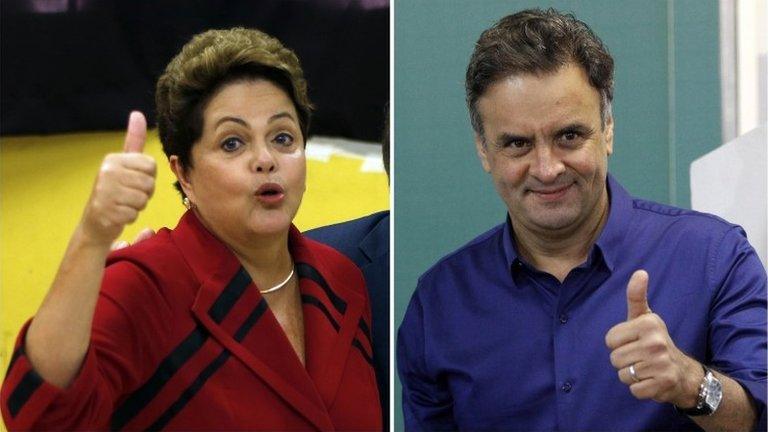
- Published9 October 2014